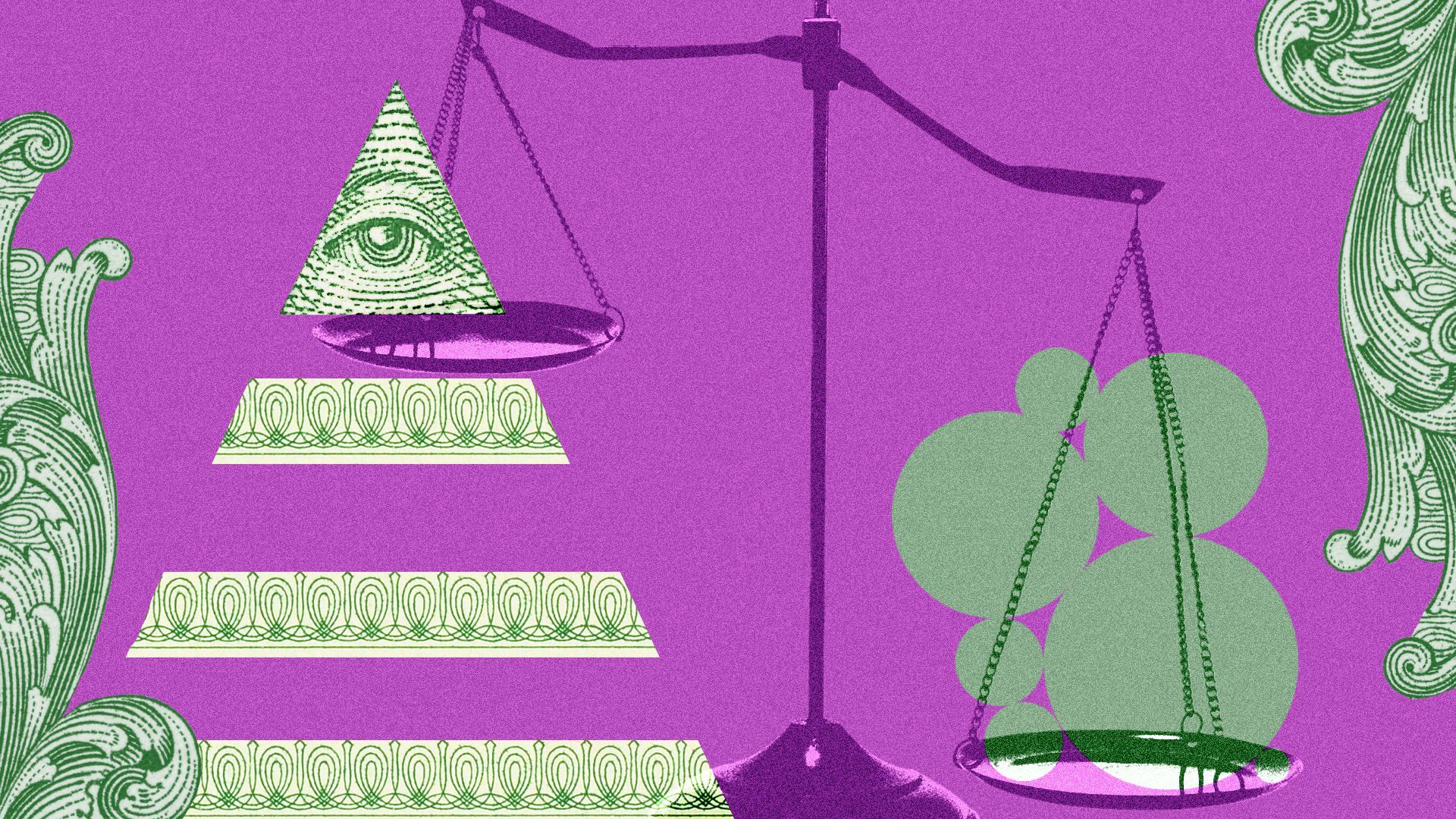| |
| |
| |
| Presented By The Northern Trust Institute |
| |
| Axios Markets |
| By Matt Phillips and Emily Peck · Sep 14, 2022 |
| 🧘♂️ OK, everyone, breathe. Yes, stocks tanked yesterday. But, on the bright side, poverty rates in the U.S. are at record lows — a product of years of policymaking. More on that below. 🚨Situational awareness: 30-year mortgage rates hit 6% for the first time since 2008, according to the Mortgage Bankers Association. We've got 1,052 words, a 4-minute read. Let's go! |
| |
| |
| 1 big thing: America's successful war on poverty |
 Data: Census Bureau; Chart: Axios Visuals America's child poverty rate plunged in 2021, hitting a record low and accelerating a decadelong decline. That's the main message from Census Bureau data released yesterday, Axios' Felix Salmon writes. Why it matters: Millions of children aren't growing up in poverty today, thanks in very large part to government poverty-reduction programs. - The most recent decline can be linked directly to the increase in the child tax credit that was implemented in July 2021 but then expired at the end of that year — which means that next year's number is likely to see a rare increase.
Between the lines: A reduction in child poverty goes hand in hand with a reduction in the number of poor parents — specifically mothers. - By the numbers: The number of women heads of households in poverty declined to 4.95 million in 2021 from 7.8 million in 2020, per the census supplemental poverty measure, on top of the 3.4 million children who were taken out of poverty.
What they're saying: The report is a "kids story but it's also a women's story," said Kate Gallagher Robbins, a senior fellow at the National Partnership for Women & Families. The big picture: Government spending on low-income children has been steadily increasing over the past 30 years, through programs like Medicaid, refundable tax credits, and the Supplemental Nutrition Assistance Program, or food stamps. Go deeper: The NYT's Jason DeParle has a deep dive into the various forces bringing poverty down in America even before the trend was accelerated by pandemic-related aid. |
    |
| |
| |
| Bonus chart: Declines across the board |
 Data: U.S. Census; Chart: Kavya Beheraj/Axios |
    |
| |
| |
| 2. Catch up quick |
| 💶 EU targets €140 billion from windfall taxes on energy companies. (FT) 📉 U.K. inflation falls for first time in nearly a year. (Reuters) 🤑 Survey indicates U.S. companies willing to list salaries. (Bloomberg) |
    |
| |
| |
| A message from The Northern Trust Institute |
| Market Currents Podcast: Listen now |
| |
 |
| |
| Market Currents, a new podcast from the Northern Trust Institute, explores today's most hotly debated investment topics. Join host Katie Nixon as she interviews industry experts to investigate the evidence on both sides. Listen now, wherever you get your podcasts. |
| |
| |
| 3. Worst day for stocks since June 2020 |
 Data: Y Charts; Chart: Axios Visuals Stocks suffered their steepest daily drop since some of the scariest months of the COVID crisis yesterday, Matt writes. The big picture: Another hot inflation report is spooking investors. Details: The S&P 500 fell 4.3%. It was the market's worst day in an awful year — and its deepest single-day decline since it suffered a 5.9% collapse on June 11, 2020. - The broad market index is down 17.5% this year, putting it on track for its worst annual showing since 2009 when it fell a horrific 38.5%.
- Tech stocks got beaten up especially badly, with the tech-heavy Nasdaq composite falling 5.2%. It's now down 26% this year.
What we're watching: Yields on U.S. government bonds — sometimes referred to as "interest rates" — which are the real source of the stock market's pain. - Treasury yields moved sharply higher after the inflation report hit, as investors bet that the Federal Reserve would have to keep raising the short-term rates it's been jacking up for most of the year to try to contain inflation.
- As we've written, interest rates are an almost invisible — but incredibly important — factor in determining stock market prices.
The bottom line: The stock market's woes won't abate until people think interest rates can stop rising. |
    |
| |
 | | | | If you like this newsletter, your friends may, too! Refer your friends and get free Axios swag when they sign up. | | | | |
| |
| 4. The housing problem is also the inflation problem |
 Data: FactSet; Chart: Axios Visuals Surging housing costs are the engine driving yesterday's worrisome Consumer Price Index report — and it's going to be tough to bring them down, Matt writes. Why it matters: The inflation numbers provoked a fresh round of worry that the Fed still hasn't gotten inflation under control, and that it'll have to raise interest rates quite a bit more. Driving the news: Core U.S. inflation — that is, price increases stripping out volatile food and energy costs — jumped more than expected in August. - That measure is up 6.3% compared to a year earlier (analysts had expected 6.1%).
The big picture: Shelter costs were the single most important category driving core inflation up, as they are weighted heavily in CPI calculations. - Rent costs were up 6.7% annually.
- Owners' equivalent rent, a measure that tries to capture the monthly costs homeowners would pay to rent their home, was up 6.3%.
- Both rates are the highest since the mid-1980s.
What we're watching: Purchase prices for homes. The COVID-related housing boom pushed the median purchase price of an existing home up roughly 50%. - That surge in home prices continues to filter through to rents, which in turn, is driving inflation.
- While the surge in mortgage rates this year has slowed buying activity, there've been few indications lately that house prices are falling much.
- So there's little reason to think inflation is going to suddenly abate much either.
What they're saying: "Typically, once those major shelter components begin to gather momentum, there's an element of inertia that tends to keep them hot for some time," says Jason Pride, chief investment officer of private wealth at Philadelphia-based money management firm Glenmede. |
    |
| |
| |
| 5. A new push to limit secret courts |
 |
|
| Illustration: Aïda Amer/Axios |
| |
| More than 110 consumer advocate groups sent a letter yesterday urging the Consumer Financial Protection Bureau to limit the ability of banks and other financial services companies to force customers with legal complaints into arbitration — essentially a private courtroom, outside the public view, Emily writes. Why it matters: The groups, which include organized labor, civil rights organizations like the ACLU and NAACP, and all of the major consumer protection outfits, are riding the momentum from landmark workplace legislation passed earlier this year that bans companies from forcing sexual harassment and assault claims into arbitration. - Consumers are often blocked from suing banks — even when real harm's been done.
- For example: After Wells Fargo employees opened up checking and credit card accounts for customers without their knowledge — ruining some folks' credit scores in the process — those people couldn't take the bank to court.
- The banks typically prevail in arbitration, studies have found. A new report from the American Association for Justice finds that the win rate for consumers against banks and financial services companies was just 1.8% from 2017-2021.
What they're saying: "Given how deeply embedded basic financial services are in consumers' everyday lives, it is essential that consumers have the ability to vindicate their rights in court, whether as individuals or as part of a group," the advocacy groups write in the CFPB letter, shared exclusively with Axios. - The letter specifically cites the "Ending Forced Arbitration for Sexual Assault and Harassment Act," which passed with bipartisan support in February. The law "further underscored how unfair and insidious forced arbitration is and how unpopular it is with the vast majority of the American public," they write.
Read more. |
    |
| |
| |
| A message from The Northern Trust Institute |
| Create value from values |
| |
 |
| |
| Do ESG investments deliver on their promise? Investors worry about sacrificing returns or whether their investments will make a difference. Next steps: Explore how Northern Trust can build a plan that reflects your values and achieves what's most important to you. Learn more. |
| |
| 👑 1 thing Emily's been thinking about: The newly crowned King Charles III will not have to pay the U.K.'s 40% tax on his inheritance from his mother Queen Elizabeth. (From the New York Times) This newsletter was edited by Kate Marino and copy edited by Mickey Meece. |
 | | Why stop here? Let's go Pro. | | |













No comments:
Post a Comment